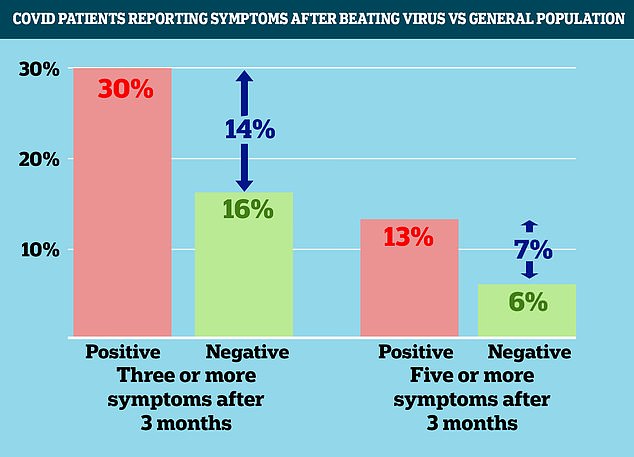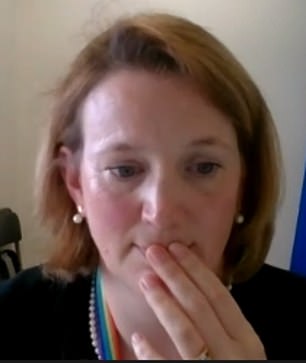Up to one in seven children in England suffer from long Covid after recovering from the initial infection, according to the largest study of its kind.
The University College London research of almost 7,000 youngsters aged 11 to 17 found 14 per cent of those who tested positive for the virus had three or more persistent symptoms three months later.
The lead scientist behind the study said the problem of long Covid in children was ‘not anything like’ the scale warned about in previous reports.
Only children who had a confirmed PCR test result were included in the research, unlike other studies, and they were compared to a control group.
Among the participants who were still feeling unwell three months after beating the virus, 7 per cent said they had five or more symptoms.
Common ailments included headaches and tiredness but there was no evidence that any of the children had ‘severe’ illness as a result of long Covid.
It comes amid a row over whether Britain should be routinely vaccinating secondary school pupils as classrooms go back and infections remain stubbornly high.
The topic has proven controversial because giving the jabs to children would be almost exclusively to protect adults from Covid.
Children are at an extremely low risk of the virus itself but previous research suggested as many as half were struck down with long Covid, which some argued was another reason to vaccinate them.

The research surveyed more than 3,000 children who tested PCR positive between January and March. They were compared to a similarly-sized group who tested negative in the same period. When surveyed around 15 weeks after their test, 14 per cent more young people in the positive group had three or more symptoms. One in 14, or 7 per cent more, in the positive group had five or more symptoms


Lead author Professor Sir Terence Stephenson, a paediatrician at UCL, told a press briefing today he felt ‘reassured’ by the findings. Dr Liz Whittaker said that long Covid did not appear to be a ‘severe disease’ in young people
Lead author Professor Sir Terence Stephenson, a paediatrician at UCL, said he felt ‘reassured’ by the findings.
He told a press briefing today: ‘The study moves us a long way forward [in understanding long Covid in children].
‘It’s not anything like the worst predictions during the height of the pandemic in December and January.’
He said that while he did not want to downplay the effect the condition has on sufferers, the prevalence in children was ‘overall better than people would’ve guessed’.
Sir Terence said the findings would be shared with the Government’s Covid vaccine advisory body, which is being lobbied to roll out the jabs in 12 to 15-year-olds.
Secondary school pupils should wear face masks when they return to school, teaching union boss says
Secondary school pupils should still wear face masks when they return to the classroom this week, a teaching union boss has said.
Dr Mary Bousted, general secretary of the National Education Union, told ministers they needed to take urgent action to avoid disruption to the new academic year.
She said: ‘It would be much better if schools had not been told to abandon measures which they adopted last term.
‘At a time when infection levels are 26 times what they were this time last year, it makes no sense to go back into school with so few safety measures.’
Yesterday Dr Bousted predicted that schools would be forced to adopt face masks and other Covid measures ‘very shortly’.
Millions of youngsters in England, Wales and Northern Ireland are set to go back to classrooms between now and the end of next week, sparking fears of an inevitable spike in cases.
Pupils in England will only be required to test themselves twice a week for the virus, with all other measures including face masks and social distancing abandoned.
But in Scotland where schools returned in mid-August, pupils and staff are still required to wear face masks and keep a one-metre distance. Despite these measures the country has seen a record surge in Covid cases.
Advertisement
The vaccines have already been approved for those aged 16 and 17 but are not routinely offered to people below that age, unless they are vulnerable themselves or live with someone who is.
Pressure is mounting on the Joint Committee on Vaccination and Immunisation (JCVI) to follow the likes of the US, Canada and France in giving children the jabs, particularly after cases skyrocketed in Scotland when schools went back a fortnight ago.
Dr Liz Whittaker, who was involved with the latest long Covid research, said that long Covid did not appear to be a ‘severe disease’ in young people, adding: ‘Vaccines prevent severe disease.’
She also added that while the jabs offer high protection against severe Covid, they are less effective at preventing transmission.
‘So it’s difficult to know whether [long Covid] could be prevented through vaccinating children or not.’
The research surveyed more than 3,000 children who tested PCR positive between January and March.
They were compared to a similarly-sized group who tested negative in the same period.
When surveyed around 15 weeks after their test, 14 per cent more young people in the positive group had three or more symptoms.
One in 14, or 7 per cent more, in the positive group had five or more symptoms, the study showed.
Researchers said their data suggests that between 4,000 and 32,000 youngsters in England had long Covid in the second wave of the pandemic.
There was little difference in the mental health and wellbeing scores between children who had long Covid compared to those who hadn’t.
Sir Terence, Nuffield Professor of Child Health at the UCL Great Ormond Street Institute of Child Health, said: ‘There is consistent evidence that some teenagers will have persisting symptoms after testing positive for SARS-CoV-2.
‘Our study supports this evidence, with headaches and unusual tiredness the most common complaints.
‘The difference between the positive and negative groups is greater if we look at multiple symptoms, with those who had a positive test twice as likely to report three or more symptoms 15 weeks later.’
The Children and young people with Long Covid (CLoCk) research will carry on, with analysis of results at six months, a year and two years from the time of the person’s PCR test.
Sir Terence said while he is reassured by these early findings, he remains ‘very concerned’ that there could be young people who are ‘severely affected’.
He added: ‘That’s something that we’ll return to when we study young people at six months.
‘But there will be some young people who are completely bedridden or remain very short of breath or have daily headaches, and I wouldn’t want to diminish that, but we’re reporting kind of aggregate numbers.
‘I think overall it’s better than people would have guessed back in December.’
The study also involves researchers at the universities of Edinburgh, Bristol, Oxford, Cambridge, Liverpool, Leicester, Manchester as well as King’s College London, Imperial College London, Public Health England, Great Ormond Street Hospital and University College London Hospitals (UCLH).
Dr Liz Whittaker, senior clinical lecturer in paediatric infectious diseases and immunology at Imperial College London, said the JCVI’s decision on extending the vaccine rollout is likely to be based on the risk of severe disease from the virus compared with risks of the vaccine, rather than the data in this study which relates to long Covid.
What are the long-term symptoms of Covid?
Most coronavirus patients will recover within a fortnight, suffering a fever, cough and losing their sense of smell or taste for several days.
However, evidence is beginning to show that the tell-tale symptoms of the virus can persist for weeks on end in ‘long haulers’ — the term for patients plagued by lasting complications.
Long term symptoms include:
Chronic tiredness Breathlessness Raised heart rate Delusions Strokes Insomnia Loss of taste/smell Kidney disease Mobility issues Headaches Muscle painsFevers Advertisement
Source link : https://www.dailymail.co.uk/news/article-9946929/Scale-long-Covid-children-like-initially-feared.html











